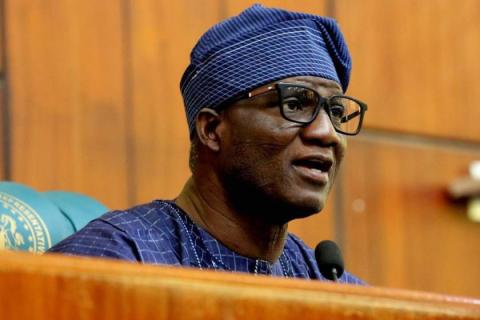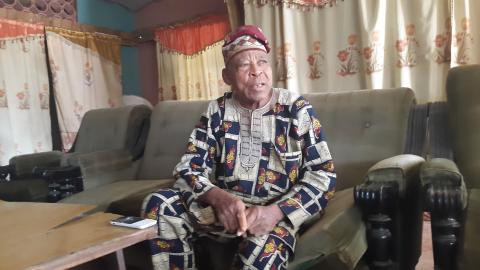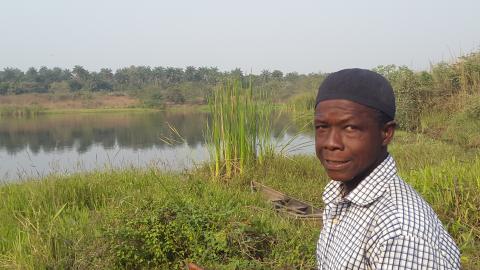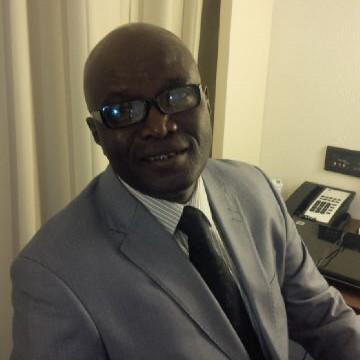
After about four months of investigations, New Telegraph’s reporter, MOJEED ALABI, exposes the corrupt practices in the execution of controversial N1.7 billion mini-water schemes in three communities in Osun State by members of the National Assembly, including the Deputy Speaker, Hon. Lasun Yusuff.

After about four months of investigations, New Telegraph’s reporter, MOJEED ALABI, exposes the corrupt practices in the execution of controversial N1.7 billion mini-water schemes in three communities in Osun State by members of the National Assembly, including the Deputy Speaker, Hon. Lasun Yusuff .
On Friday, January 5, the sun was fierce and scorching in Ife-Odan, a nascent community in the West Senatorial District of Osun State.
Ileri-Oluwa Oloyede, an SS 2 student of Faith Foundation College, Ife-Odan, had just returned from market where she had helped her mother in her palm oil business. But the 16-year-old girl still had one more chore to do; to fetch water for the urgent need of the household.
Considering the stress she had gone through at the market, Ileri-Oluwa’s parents advised her to wait till sundown. But the longer she waited, the more difficult her chances of getting water became and the longer it would take the family to prepare dinner.
“If I wait for the sun to go down, many more people will be at the well, and that would worsen the situation. And if the crowd becomes uncontrollable, the landlord may lock his gate and drive us out,” she said.
Thus, while the sun was yet to finally recede, Ileri-Oluwa and her younger sister, Florence, hit the road for a three-kilometre trek in search of clean water at the nearest well.
It is the same story for Michael Adeoba, who was also on the road, almost at the same time, with his father’s motorcycle to fetch water into some 20-litre jerrycans.
Adeoba, who had battled to get the motorcycle started, apparently due to some mechanical faults, decided to push it to a nearby mechanic workshop for a quick fix before going for the water.
He said: “This is what I go through every other day. Whenever I am on holiday, I always dread this experience. In fact, it is more of punishment than chore.”
The experiences of both Ileri-Oluwa and Adeoba reflect the pains and pangs of the people of Ife-Odan in their efforts to access clean water.
The situation is similar in many communities in the agrarian state, particularly during dry season when many wells and streams are dried up and public water supply is scarce due largely to poor electricity supply.
Addressing this perennial challenge was the concern of 12 parliamentarians, who represented the state in the National Assembly between 2011 and 2015, comprising three senators and nine House of Representatives’ members.
The federal lawmakers, who were elected on the platform of the defunct Action Congress of Nigeria (ACN) before the party merged with others to form the ruling All Progressives Congress (APC), had pursued common agenda, apparently towards fulfilling their party’s campaign promises.
One of them and now the Chief Whip of the eighth Senate, Prof. Sola Adeyeye, representing Osun Central Senatorial District, told New Telegraph that the senators and the nine members of the green chamber had agreed to facilitate the execution of joint projects in the state, through the National Assembly’s Zonal Intervention Projects (ZIP), otherwise known as “constituency projects.”
Therefore, when the 2012 budget was being prepared in 2011, they agreed to jointly facilitate the construction of a mini-water scheme in each senatorial district.
But Adeyeye’s original plan for his district, he claimed, was the reconstruction of the narrow Ojutu Bridge in Ilobu, headquarters of Irepodun Local Government Area. However, this position was overruled by Governor Rauf Aregbesola, “who said we should do water.”
“But none of us could singlehandedly fix water, so we decided to have three mini-water schemes across the three senatorial districts,” Adeyeye added.
After a careful study, Ife-Odan was chosen as the beneficiary community in Osun West; Ipetu-Ijesha in Osun East, and Ila-Orangun in Osun Central Senatorial District, for the construction of the mini-water schemes.
As captured in the 2012 Appropriation Act and contained in the South West Geo-Political Zone Mapping of Capital Projects by the National Assembly Budget and Research Office (NABRO), a total sum of N1,666,666,668 was budgeted for the projects at the rate of N555,555,556 for each.
But according to Ogun-Oshun River Basin Development Authority (OORBDA), the contract supervising agency, it eventually awarded the Ife-Odan scheme at the sum of N538,412,653.06; Ila-Orangun at the rate of N539,128,429.13 while N541,193,861.23 was approved for Ipetu-Ijesha project. Thus the new total sum released for the project stood at N1,618,734,943.47.
There was also additional budgetary allocation of N100 million each for the three mini-water schemes in the 2013 budget proposal but there was no evidence that the money was released.
Projects excite communities
When the beneficiary communities received the news of their selection for the location of the projects, they heaved a sigh of relief that potable water would no longer be a luxury.
According to the Risapetu and Regent of Ipetu-Ijesha, High Chief Ayodele Olayinka, some government representatives had approached the community’s palace on a Sunday in 2012, and demanded a parcel of land for the location of the project.

“We told them to wait till Monday but they insisted they needed to start that same Monday. Though Kabiyesi was still alive then, he was already very old. So, with two other chiefs, we went there, and gave them the site. We were very elated and anxious to see the project commenced,” the chief explained.
He said true to their words, the contractor resumed to the location on the appointed Monday and began with the clearing of the bush.
“We were then visiting the site on a regular basis, at least, to show solidarity and support,” the chief added.
The experience was more exciting in Ife-Odan, where the government’s dam, created many years ago from Sekunrebete stream, which supplies water to the community and its environs, had been facing a series of challenges, including theft of its generator.

According to an officer of the state Water Corporation and the dam’s Superintendent Officer, Mr. Adeyemi Oyekola, who reluctantly spoke to New Telegraph, apart from the power issue, the dam was enough to serve the community.
He said: “In fact, there is no point bringing up a new water scheme. What this place needs is just a good generator, and repair of some of the machines and the reticulation networks, then, the community will be good for it.
“The major challenge here is power because the voltage is always low and cannot power the pumping machines.”
Thus, the desire to see the water scarcity problem addressed and the prospect of job opportunities at the site for the youth of the community inspired a farmer, Mr. Azeez Moradesa, to donate about four plots of land for the project.
The parcel of land is part of Moradesa’s inheritance and located beside his house at Araromi area of the town, which is less than two kilometres to the crisis-ridden dam.
He said: “So when they started the construction, I was employed as the security guard by the contractor. They were paying me N20,000 every month.”

Similarly, a former student of the Osun State College of Education, Ila-Orangun, AbdulKadir Oladosu, who was in year one when the construction work started at the Ila-Orangun site in 2012, said the students, in particular, were excited, “due to the suffering we were going through to get water.”
Inauguration of uncompleted projects
Five years after the projects were initiated, in February 2017, the Ogun-Osun River Basin Development Authority (OORBDA), having allegedly certified the contractors for jobs well done, held a symbolic inauguration at the Ila-Orangun plant, and handed them over to the Osun State government, through its water corporation.
Though, the inauguration took place at Ila-Orangun, the documents and keys to the other two projects were also handed over to the state government. Thus, by this handover, New Telegraph learnt, it became the responsibility of the corporation to manage and operate the facilities for the benefit of the people.

Projects dead on arrival
Six years after people’s hope had been raised, New Telegraph’s investigations revealed that the projects have failed to ameliorate the water scarcity the communities face. In Ife-Odan the massive water plant erected by the contractor is yet to produce a drop of water.
When visited by our correspondent, the facility had already been overtaken by weeds and cobwebs, without anyone found in the compound.
The guard, Moradesa, who, apparently was disappointed by the turn of events, was not on hand to conduct our reporter round the facility. But his son, Joseph Moradesa, who did, was not impressed by the development.
When he eventually spoke to our correspondent, the guard expressed regret that six years after the project was initiated, there was yet to be water for the people at the plant.
Moradesa, who spoke in Yoruba language, said: “Even as the guard, since February 2017 when the place was transferred to Osun State Water Corporation, my salary has been reduced to N15,000 and I received the last one in October 2017. What pained me most is that this place is already abandoned and the purpose for which I donated the land may have been defeated.”
Also speaking, a palace chief, the Obajio of Ife-Odan, Chief Amoo Adegbite, expressed regret that the people’s hope had been dashed by the alleged poor handling of the project, saying the whole community was disappointed after so much expectation.
Adegbite said; “Many of us had thought what they wanted to do was to connect the dam and make the water supply easier. But we were surprised when they started digging borehole just few kilometres away from the dam, and we were worried that it might turn out to be a wasted effort due to our experiences with boreholes here.”
Son of a late traditional ruler of the community, Prince Gbade Morenikeji, who had visited the town for the New Year celebration, said one of the reasons the community voted against the return of one of the 12 representatives, Senator Mudashiru Hussein, was largely due to the abandoned water project.
Morenikeji, who works with the Federal Ministry of Industry, Trade and Investment, noted that following the death of Senator Isiaka Adeleke, Hussein had been represented by the ruling party, the All Progressives Congress (APC), for the rerun election, “but because the water project he had facilitated to the community during his first term was seen as a scam, the people said, no way.”
Meanwhile, the superintendent at the community’s dam has revealed that with the construction of the water scheme, the pipes laid from the dam to the community had been destroyed by the contractor. He said: “Even if there is power supply it will be difficult to supply water because of the damage done to the pipes when they were laying their own pipes.”
In the same vein, at Iloro area of Ipetu-Ijesha, just a few metres away from Grammar School Road, location of the community’s own water plant, an ND I student of the Federal Polytechnic, Offa, Kwara State, Aduragbemi Idris, was guarding jealously a padlocked well.
She denied knowledge of any public water scheme in the neighbourhood, saying her uncle and owner of the house, reluctantly locked the well because of the pressure from the public.
Similarly, the Regent was livid with anger, as he showed our reporter his well within his own compound.
Chief Olayinka explained: “When they were laying the pipes, they fixed them in the wrong side and I told them that the side would not be good for the pipes due to the telegraphic poles. They didn’t take my advice, but after they had laid the pipes for about a month, they heeded my advice and moved to the other side. Later, we didn’t see them again.
“So, people are back to the streams as it was the practice in the olden days. We are just lucky that our people are not affected by water-borne diseases. Of course, it is now an abandoned project, and that is sad. This is because some of the ‘honourables’ (National Assembly members representing the state) who started the project are no longer in government. The new ones are now embarking on new projects individually, which are also already being abandoned.”
But when New Telegraph visited the plant at Ipetu-Ijesha, a security guard on duty, Mr. Adeleke Faleti, explained that the facility had been operational since 2016 till sometimes in November 2017, when it developed mechanical fault.
Faleti, who is an employee of Evermore Securities, a private security company, explained that apart from the challenges posed by erratic power supply and non-availability of diesel, the facility had served the few available ‘town tap points’ until it developed problems.
He said: “The engineer in charge is not on ground, and I am aware he has written to the state to complain about the mechanical faults developed by some machines.”
Also, a civil servant who lives in Ila-Orangun but craved anonymity, said apart from the four tap points sited at the water plant, there was no other public tap point within the vicinity that he was aware of.
The plant, which is located at the College High School area, in the community, serves only the people living within the neighbourhood.
“I cannot even attempt to fetch from the well in my house because it is too deep, and can take five minutes to get a single bowl of water. So, I have to drive to the water plant to fetch into jerrycans, at least every two days,” the source explained.
Osun State Water Corporation kicks, rejects projects
Embittered by the poor work done allegedly by the contractor, the state Water Corporation rejected the projects at Ila-Orangun and Ife-Odan. It said the water yields at the two sites were grossly inadequate due to the shoddy jobs done.
The corporation’s Deputy General Manager, Operations and Production, Mr. Ademola Odejide, an engineer, said the three projects were handed over to the corporation in February 2017, but after a careful study, those located at Ila-Orangun and Ife-Odan were returned to the agency for correction of all identified defects.
Odejide said: “Immediately we received the projects we wrote down our observations and recommendations, but our memo did not get to the governor on time because he was not around.
“But as soon as we received the go-ahead, only the Ipetu-Ijesha got our approval, so we sent back all the documents handed over to us for Ila-Orangun and Ife-Odan with the instruction that they should go and correct all the defects. We recommended a better industrial borehole for Ila-Orangun and raw water supply at Ife-Odan because the boreholes sunk could hardly yield 20 per cent.”
According to Odejide, the Ila-Orangun scheme is later provided with the required industrial borehole but the Ife-Odan project was now being linked to the dam, which hasn’t been completed.
But another officer of the corporation, who craved anonymity, explained that the problem with the project is that both the OORBDA and the contractors failed to do their due diligence. According to him, researches have shown that borehole water in a basement complex terrain like Osun State cannot yield the required volume of water to serve a whole community.
“You know, in engineering, when something is not in your field, you can hardly know it; OORBDA is only known for dam, not for water supply. In fact, the Federal Ministry of Water Resources carried out a survey on water projects, which indicates that there are so many boreholes being drilled across the state especially in our own area, which are not yielding desired results because of the differences between the basement complex terrain and sedimentary basin.
“In Lagos, and parts of Ogun, borehole can easily yield required volume of water because it is a sedimentary basin. But these contractors don’t like to hear this. In fact, the contractors had in the past threatened to eliminate some of us, saying we are running them down. When the National Assembly invited some of our officers for explanation on the matter, because we explained all this, the contractor, which we later learnt is a federal lawmaker, threatened to ‘waste’ us.
“The current Deputy Speaker of the National Assembly owns the company that handled the Ila-Orangun and Ife-Odan projects. It is a secret arrangement between him and the contract awarding agency because it is against the law. Even, most of his colleagues who facilitated the projects didn’t know this until more than three years after, when the projects began to constitute problems,” the source said.
Search for contractors begins
Apart from the Ipetu-Ijesha project where the carcass of a billboard indicating the contractor’s name and other details could be found standing filthily on the wall of the plant’s fence, there is nothing to link the Ila-Orangun and Ife-Odan projects to their handlers. This informed New Telegraph to approach the OORBDA, as the contract supervising agency, for the details of the projects.
Ogun-Oshun River Basin Development Authority (OORBDA) responds
At a brief meeting held in January with our correspondent at the office of its Managing Director and Chief Executive Officer, Mr. Olufemi Odumosu, in Abeokuta, Ogun State, the Ogun-Oshun River Basin Development Authority suggested to formalise its response to New Telegraph’s enquiries, saying further communication could be established afterwards.
Thus, in a tersely-worded letter, dated January 18, 2018, and addressed to New Telegraph, it explained that after competitive bidding processes, two companies were awarded the contracts in 2012. They are Sabbyn Nigeria Limited, an oil and gas company, and Nur and Company Nigeria Limited, an engineering company.
The letter, which was signed by Odumosu, also stated the locations awarded to each of the two firms and the amount approved for each of the projects, adding that the duration for the execution of the projects was 12 months.
It said the Ipetu-Ijesha project was handled by Sabbyn Nigeria Limited while the ones located at Ife-Odan and Ila-Orangun were awarded to Nur and Company Nigeria Limited.
The letter reads in part: “The contract award process was in line with the provisions of the Procurement Act 2007.”
However, the agency failed to supply other vital information including the details of the bidding processes, registration numbers of the selected companies, how money was paid to the contractors, reasons for the alleged abandonment of the projects, allegation of poor productivity, among others.
The agency had initially claimed its officers could no longer lay their hands on the projects’ documents because “it was a long time it worked on the files,” but following unrelenting requests from our correspondent, on January 31, 2018, the agency’s Public Relations Officer, Mr. Saliu Adeniyi, sent the registration numbers and the addresses of the two companies via text messages.
CAC links Deputy Speaker to Nur & Company Nigeria Limited
Unlike the Sabbyn Nigeria Limited, which details were easily accessed on the internet, the details of Nur and Company Nigeria Limited, which executed both the Ife-Odan and Ila-Orangun projects, seemed to have been shrouded in secrecy, as the name could not be traced anywhere. It has no website, contact details, or even a social media account.
Its address at Plot 8, Impressive Close, off Dosumu Street, Agidingbi, Ikeja, Lagos, as reportedly quoted on its application document for the bidding exercise, belongs to a different owner entirely. The issue of this address alone caused more controversies than could be imagined, leading to the death of an octogenarian over the fraudulent acts of some alleged individuals.

But the Corporate Affairs Commission (CAC) helped in no small measure to unravel the mystery surrounding the owners of the companies, including the Nur and Company Nigeria Limited, which is owned by Deputy Speaker of the House of Representatives, Mr. Lasun Yusuff.
The deputy speaker, according to our findings, used his personal company to secure the two projects, even as investigations also revealed that the high ranking parliamentarian failed to execute these projects as specified by the awarding agency.
Deputy Speaker keeps mum

The series of New Telegraph’s enquiries sent to the Deputy Speaker, Hon. Lasun Yusuff, through his media aides, including his Special Adviser (Media), Mrs. Lara Owoeye-Wyse, were unanswered.
However, upon receiving New Telegraph’s letter, which was submitted to Owoeye-Wyse on January 9, the deputy speaker’s Chief Press Secretary, Mr. Wole Oladimeji, called our reporter on Thursday, January 11, on behalf of his boss to deny any knowledge of the projects. But when asked whether he had raised the matter with his boss before giving defence, Oladimeji said no, and promised to revert. He has since not got back to New Telegraph till date.
Meanwhile, in the second part of this report, many interesting twists about the whole issue will be revealed.
Sabbyn Nigeria Limited found
Locating Sabbyn Nigeria Limited, which handled the Ipetu-Ijesha mini-water scheme, wasn’t a difficult task. A simple search on the internet revealed the company’s website, its owner, and contact details. Its Managing Director and Chief Executive Officer, Mr. Abayomi Collins, an engineer, had represented Ifo/Ewekoro Federal Constituency in the House of Representatives between 1999 and 2007. He was Chairman, House Committees on Petroleum Resources, National Planning and Economy, and Water Resources.
Collins took time to explain his own side of the story, insisting that his company executed the project to specifications and that all rules were followed to the letter.
He said: “This project was handed over, inaugurated and was operational. We have certificates to prove this. When you complete such a project you are first given a mechanical completion certificate. Every system, generator, water and other things were certified okay. And it was handed over to Osun State Water Corporation because it is the end beneficiary.
“We completed the project in 2015 and men of the Osun State Water Corporation came to the site to understudy the situation. But officially, it was taken over in June 2016, which was even pretty long. People in the town can confirm that as far back as 2015, they were receiving water far away, where we terminated the pipeline at the Osun State University campus in the town, which is the remotest part of the reticulation network.”

Collins added that after the expiration of the six-month-defect-liability period, his company was discharged of any liability to the project.
“As a matter of fact, we were discharged completely in 2016, and since then we have been requesting for the payment of our own five per cent retention fee which was N26.7 million. Up till now, they have only paid marginally N8 million,” he said.
Asked why an oil and gas company would be awarded a water project, Collins explained that his company provided services to oil and gas, and that water service was also one of them. “So, it is part of the services we render. The company is registered with CAC. I am ready to open books for you on this.”
Collins also responded to the delay in the execution of the project. “This is typical of government projects. Projects progress as funding is made available in yearly budgets. We have several government projects with Federal Capital Development Authority (FCDA), Federal Ministry of Water Resources, Ogun-Oshun River Basin Development Authority, which have not been funded in the last four years. We will only be able to continue when they are funded.”
•This is the first part of an investigative budget tracking report with the support of Macarthur Foundation and the International Centre for Investigative Reporting (ICIR)